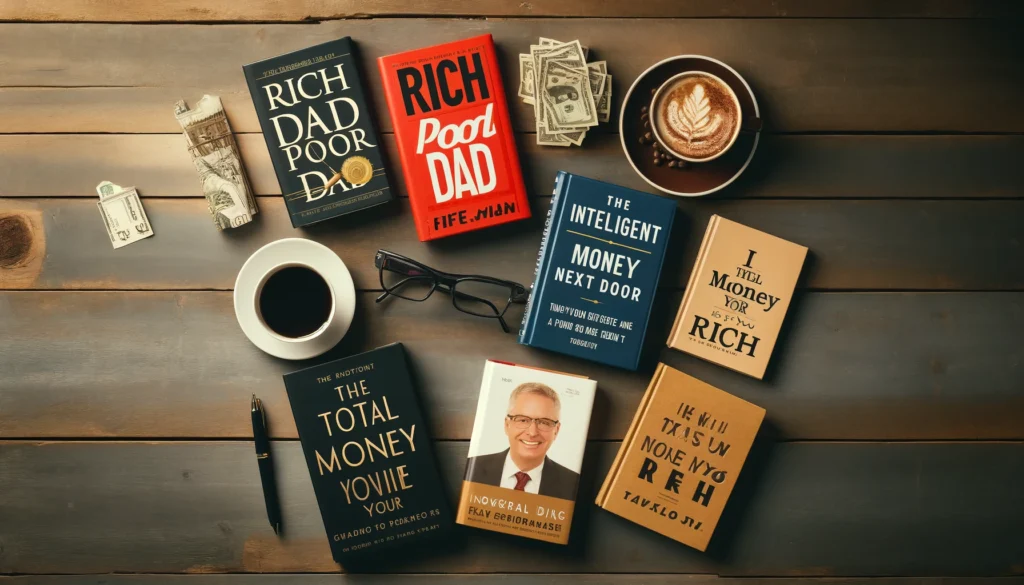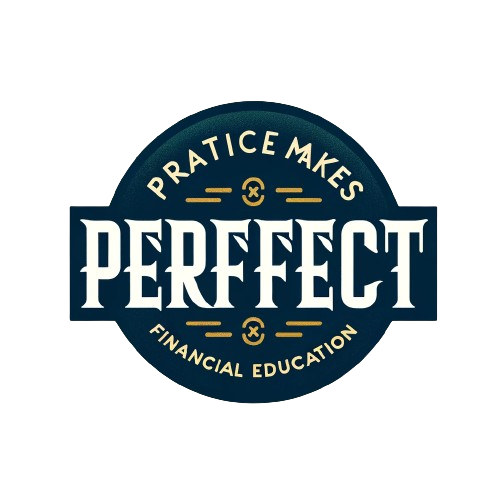Books for Financial Education
In the world of personal finance, knowledge is power. Whether you’re just starting your financial journey or looking to refine your strategies, the right books can provide invaluable insights. I’ve put together a list of the best books for financial education to help you boost your knowledge and take control of your financial future. So, please grab a cup of coffee, get comfortable, and let’s dive into these must-read financial books!

1. “Rich Dad Poor Dad” by Robert T. Kiyosaki
Why It’s a Must-Read: “Rich Dad Poor Dad” is a classic that contrasts the financial philosophies of the author’s two fathers – his biological father (Poor Dad) and his best friend’s father (Rich Dad). Kiyosaki’s insights on money management and investing are eye-opening and accessible, making it a great starting point for anyone new to financial education.
Highlights:
- The importance of financial literacy
- The difference between assets and liabilities
- How to think like an investor
Best For: Beginners who want to change their mindset about money and learn essential financial principles.
2. “The Intelligent Investor” by Benjamin Graham
Why It’s a Must-Read: Benjamin Graham’s “The Intelligent Investor” is a cornerstone of value investing. Warren Buffett himself calls it “by far the best book on investing ever written.” It offers timeless advice on how to make intelligent investment decisions and manage your portfolio.
Highlights:
- The principles of value investing
- The importance of thorough research
- Strategies to minimize risks
Best For: Serious investors looking to deepen their understanding of investment principles and strategies.
3. “Your Money or Your Life” by Vicki Robin and Joe Dominguez
Why It’s a Must-Read: This book is all about transforming your relationship with money and achieving financial independence. It provides a nine-step program to help you track your finances, reduce expenses, and live more deliberately.
Highlights:
- The actual cost of your time and money
- How to align your spending with your values
- Steps to achieve financial independence
Best For Anyone looking to gain control over their finances and find a balance between earning and living.
4. “The Millionaire Next Door” by Thomas J. Stanley and William D. Danko
Why It’s a Must-Read: “The Millionaire Next Door” reveals the surprising characteristics common among America’s wealthiest individuals. Spoiler alert: they’re not who you think they are. This book challenges conventional ideas about wealth and offers practical tips for building it.
Highlights:
- The Habits and traits of self-made Millionaires
- The importance of frugality and planning
- Long-term strategies for wealth accumulation
Best For: Anyone interested in understanding the behaviors and attitudes that lead to financial success.
5. “The Total Money Makeover” by Dave Ramsey
Why It’s a Must-Read: Dave Ramsey’s no-nonsense approach to personal finance is both motivational and practical. “The Total Money Makeover” offers a step-by-step plan to pay off debt, build an emergency fund, and secure your financial future.
Highlights:
- The seven baby steps to financial freedom
- Strategies for getting out of debt
- Tips for building wealth and security
Best For: Individuals seeking a clear, actionable plan to improve their financial situation.
6. “I Will Teach You to Be Rich” by Ramit Sethi
Why It’s a Must-Read: Ramit Sethi’s book is a straightforward guide to personal finance for young adults. It covers everything from banking and saving to budgeting and investing, with a touch of humor and a lot of practical advice.
Highlights:
- Automating your finances
- Conscious spending principles
- Investing strategies for beginners
Best For: Young professionals and anyone looking to create a solid financial foundation.
Understanding Financial Education Through Books
If you’re serious about mastering personal finance, investing in a few good books can be one of the best decisions you make. Financial education through books provides a comprehensive understanding of money management, investing, and wealth-building strategies. Here’s why these top picks should be on your reading list:
- Diverse Perspectives: Each author brings unique insights and experiences, offering various approaches to managing money and building wealth. Whether it’s Robert Kiyosaki’s mindset shifts in “Rich Dad Poor Dad” or Benjamin Graham’s value investing principles in “The Intelligent Investor,” you get a broad spectrum of financial wisdom.
- Practical Strategies: Books like “The Total Money Makeover” by Dave Ramsey and “I Will Teach You to Be Rich” by Ramit Sethi provide actionable steps you can implement immediately. These strategies range from debt reduction and budgeting to investing and retirement planning.
- Behavioral Insights: Understanding the psychology behind financial decisions is crucial. “Your Money or Your Life” by Vicki Robin and Joe Dominguez dives deep into the relationship between money and happiness, encouraging you to align your financial goals with your values.
- Long-Term Wealth Building: “The Millionaire Next Door” by Thomas J. Stanley and William D. Danko shows that wealth is often built through discipline, frugality, and strategic planning rather than high incomes or risky investments.
- Financial Independence: Many of these books focus on achieving financial independence, where your investments generate enough income to cover your living expenses. This concept is central to “Your Money or Your Life” and echoed in other titles, providing a roadmap to freedom from financial stress.
Tips for Getting the Most Out of Financial Books:
- Take Notes: Jot down key points and actionable tips.
- Apply What You Learn: Implement strategies in your daily life.
- Discuss with Others: Join book clubs or online forums to share insights and experiences.
- Revisit Often: Financial principles can be complex; re-reading can help reinforce your understanding.
By the end of this reading journey, you’ll have a solid foundation in personal finance, equipped with the knowledge and tools to make informed decisions and build a prosperous future.
Conclusion
Investing time in reading these financial education books can pay off immensely. They offer a wealth of knowledge, practical advice, and inspiration to help you achieve economic independence and success. Whether you’re a novice looking to get started or an experienced investor seeking new strategies, these books have something valuable to offer. So, pick up a book, start reading, and take the first step toward mastering your finances today!

